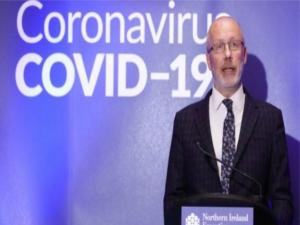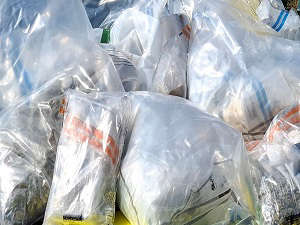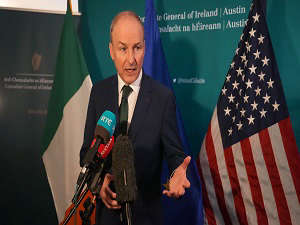
By David Young and Rebecca Black, PA
People in Northern Ireland should prepare for the potential of multiple winter lockdowns, Stormont’s chief scientific adviser has said.
Professor Ian Young said it is not yet certain whether intensive periods of lockdown will be required to halt the spread of the coronavirus but that it would be “sensible” for the public to plan on that basis.
His comments came after the devolved executive’s chief medical officer, Dr Michael McBride, also advised people to prepare for a potential second lockdown.
The Stormont Executive announced a wide-ranging series of restrictions for the Derry City and Strabane Council area on Thursday in an effort to stem the spiralling Covid-19 infection numbers in the north-west of Northern Ireland.
They include hospitality businesses being limited to takeaway, delivery and outdoor dining, and a call to avoid unnecessary travel.
Prof Young suggested the Executive would have little alternative but to opt for a full lockdown in the Derry City and Strabane area if rates are not brought under control in the coming weeks.
On the prospect of the whole of Northern Ireland having to be in lockdown for a two-week period – a so-called circuit break – he told BBC Radio Ulster’s Nolan Show there are several options open to the Executive.
“Probably one of the most effective is certainly this idea of a circuit breaker or a relatively short-term lockdown,” he said.
“I don’t think that a single period of lockdown or circuit breaker would be sufficient to get us right through the winter.”
He added: “I think it would be sensible to plan for the possibility of one or more periods of circuit break over the course of this winter.
“I don’t know, I can’t say, whether that’s something that will be required, but I think it would be sensible to plan for it.”
Dr McBride also did not rule out a short, intensive lockdown.
“I do believe that we need to plan and prepare and look at options around a so-called circuit breaker,” he told BBC Radio Ulster.
“For us to get through the next number of months, we may well need to apply further restrictions, perhaps for a short period of a couple of weeks … and then, if the virus starts to increase again, we may need to reapply some of those wider further restrictions.
“It is crucially important that we keep on top of this virus and we deploy all of the tools in our toolbox.
“There is no magic bullet here, no hammer that you can take out that will suppress this virus; it is about the combination of interventions, restrictions that reduce mixing between people.
“There may come a point, if we see very significant transmission at a Northern Ireland level, that we need to move away from local restrictions to wider restrictions at a Northern Ireland level, and that may include a circuit breaker.”
Dr McBride added: “We have a very narrow window now to act, the consequences would be profound if we don’t.”
The CMO said he is “deeply worried” about the increase of case numbers in Derry City and Strabane.
He also voiced concerns about rising case numbers in the Belfast, Newry, Mourne & Down, and Mid Ulster Council areas.
He said it is an “extremely and deeply worrying time”.
“We’re seeing a rapidly deteriorating situation in terms of the number of new cases, but also the number of admissions to hospital and the number of admissions to our intensive care units,” he said.
On Thursday, First Minister Arlene Foster said any new period of full lockdown in the region should only happen as part of a co-ordinated move across the UK.
Deputy First Minister Michelle O’Neill said a lockdown, if it were to be required, should be undertaken across the island of Ireland and the UK.
Asked if the mid-term school holiday at Halloween would be a suitable time to introduce a lockdown, Prof Young said: “In terms of the likely impact of a circuit breaker it would be more effective if schools were off at the same time than if schools were functioning.”
But Stormont’s expert adviser said he did not think it would be appropriate to introduce such a measure over the Christmas holidays.
“I don’t think for a whole variety of reasons that that’s a reasonable thing to do,” he said.
Prof Young also questioned a claim by PSNI Chief Constable Simon Byrne that there has been 90% compliance with the rule requiring the wearing of face coverings in retail outlets and on public transport.
“I don’t believe that we have seen robust statistical data to support that,” he said.
“My personal observation is that certainly in large supermarkets the use of face coverings is in that sort of area (90%), but I suspect that it is not as high as that in smaller stores.”


 Drugs worth £860,000 seized following search in Kilkeel
Drugs worth £860,000 seized following search in Kilkeel
 Additional public transport announced ahead of Open golf event at Royal Portrush
Additional public transport announced ahead of Open golf event at Royal Portrush
 Man who forced vulnerable women into prostitution given seven-year sentence
Man who forced vulnerable women into prostitution given seven-year sentence
 Taoiseach announces further one billion euro for Shared Island Fund
Taoiseach announces further one billion euro for Shared Island Fund
 Details of two Troubles archive projects announced by Government
Details of two Troubles archive projects announced by Government